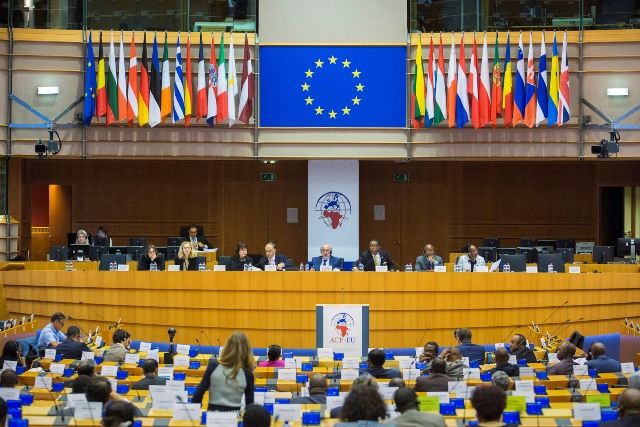 The EU and the ACP meet in 2018 to agree on post-Cotonou arrangements. [photo: European Parliament news]
The EU and the ACP meet in 2018 to agree on post-Cotonou arrangements. [photo: European Parliament news]
[This is an excerpt from a research article appearing in The Round Table: The Commonwealth Journal of International Affairs.]
An area where negotiations stumbled was good governance in tax matters, linked to the fact that various Caribbean countries were included by the EU in the list of non-cooperative tax jurisdictions with a view to addressing the risks of tax abuse and unfair tax competition. Indeed, on several occasions and in different contexts, various Cariforum representatives expressed disconcert about what they perceived not only as an attack on national sovereignty and a clear violation of the partnership principles, but also as an initiative causing irreparable harm to already vulnerable economies by threatening one of the few thriving sectors, that is international financial services. Thus, while the Caribbean attacked the EU’s initiative for being unilateral and claimed that the appropriate forum to deal with tax matters is the OECD Forum for Harmful Tax Practices, the EU defended it, arguing that it was meant to have a positive effect on changing unfair behaviour of numerous states and a positive influence on internationally agreed tax good governance standards (Agence Europe, 8 December 2017; Jamaica Observer, 13 March 2019; Guyana Chronicle, 17 April 2019; West Indies News Network, 22 April 2019).
Less acrimonious but still contentious were be the talks on economic development – interestingly however, some observers claim that the Caribbean is of marginal significance for the EU, whereas the EU represents a vast market for Caribbean goods and services. Indeed, when the Cariforum-EU EPA was signed 2008, the expectation was increased access to the EU market for Caribbean exports (Heron). Results have been mixed at best, with the Dominican Republic somehow profiting and Commonwealth countries experiencing declines in exports, with the members of the Organisation of Eastern Caribbean States suffering the most. The Caribbean side, unsurprisingly, wished to use the post-Cotonou process to transform the market access granted by the EPA into a market presence for Caribbean goods, but most importantly services, pushing for mutually recognition agreements for specific professional services and support for cultural professionals. The EU, on its part, had on many occasions stated that EPAs are self-standing agreements, yet it could support efforts to better implement the Carifoum-EU EPA, primarily related to capacity building, and adopt measures to mobilise higher flows of investment.
Conclusion
The post-Cotonou Agreement is set to mark a turning point, once again, in EU-Caribbean relations. Since the adoption of the first Lomé Convention, when Caribbean Commonwealth states played a crucial role for the successful conclusion of the negotiations but also for the creation of the ACP Group, EU-Caribbean relations have often been in flux. Indeed, on the eve of the launch of the negotiations for the post-Cotonou Agreement, a senior official from the Cariforum Directorate claimed that change has been the only thing which has been constant since the 1970s, but such change for the most part has been positive (Barbados Advocate, 7 June 2018).
This article has elaborated on the post-Cotonou process, showing that for numerous areas the interests of the two sides coincided: both were eager to promote multilateralism, with a view to driving global action forward, and to support regionalism, seen as an effective way to unlock economic opportunities and address cross-country challenges. At the same time, the accession of new countries into the ACP Group, strengthening the role of non-Commonwealth states, and the emergence of new areas of cooperation, notably human security, governance, environment and climate change, have added complexity and at times generated tensions between the EU and the Caribbean. The two traditional pillars of cooperation have been subject to substantial changes: foreign aid has significantly declined in importance and is destined to do so even more in the future; the new trade regime has yet to fully deliver. Furthermore, there have been divergences on how to frame EU-Caribbean relations: through the prism of EU-ACP relations, as preferred by Commonwealth countries, or through the prism EU-LAC relations, as favoured by non-anglophone countries – and some mixed messages coming from the EU have not helped. With the growing agency of the African Union and the further development of the African continent, it is possible that Caribbean states may be dwarfed by African states in the ACP context. But the same can be true when Caribbean states engage with emerging powers in Latin America, such as Brazil, and also Argentina, Mexico or Chile. Nevertheless, on the basis of preparatory process and initial stages of the negotiations for a post-Cotonou Agreement, it can be safely concluded that any claims that the European Union and the Caribbean are drifting away are unwarranted and that their partnership – in spite of various external pressures and some uncertainties on how to frame it – appears solid.
Maurizio Carbone is Professor of International Relations & Development, School of Social and Political Sciences, University of Glasgow.



